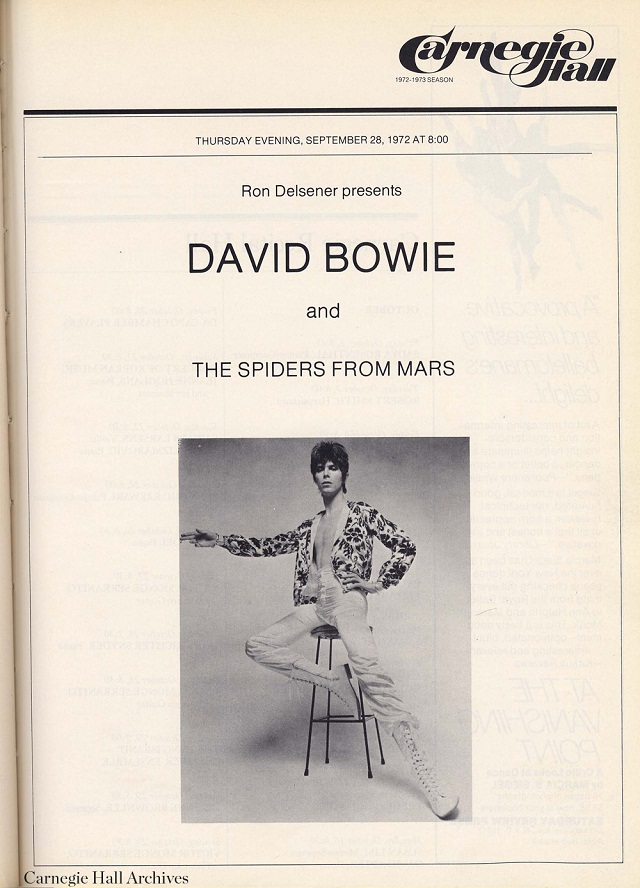 For the hip socialites of NYC, when David Bowie made his Big Apple debut in his Ziggy Stardust mode backed by The Spiders From Mars at Manhattan’s legendary concert venue, Carnegie Hall, it was quite the hot ticket and place to be seen. Andy Warhol, who liked traveling with an entourage, could only get two tickets (even though Bowie would play his song about the famed artist that night). Atlantic Records Founder and President Ahmet Ertegun supposedly couldn’t get one. In the audience was writer Truman Capote, socialite Lee Radziwill (sister of Jackie Kennedy Onassis), actors Tony Perkins and Alan Bates, Todd Rundgren and members of the New York Dolls.
For the hip socialites of NYC, when David Bowie made his Big Apple debut in his Ziggy Stardust mode backed by The Spiders From Mars at Manhattan’s legendary concert venue, Carnegie Hall, it was quite the hot ticket and place to be seen. Andy Warhol, who liked traveling with an entourage, could only get two tickets (even though Bowie would play his song about the famed artist that night). Atlantic Records Founder and President Ahmet Ertegun supposedly couldn’t get one. In the audience was writer Truman Capote, socialite Lee Radziwill (sister of Jackie Kennedy Onassis), actors Tony Perkins and Alan Bates, Todd Rundgren and members of the New York Dolls.
For English sensation Bowie’s first show in New York on September 28, 1972, and just his third in America, RCA Records and his MainMan management went all out to signal it as a significant occasion. A spotlight out front shone its beam into the sky like it was a movie premiere. The Carnegie Hall marquee read: “Fall In Love with David Bowie.” A number of the tickets had supposedly been distributed to some of the more fashionable freaks on the Downtown social scene. Outside, scalpers were doing a brisk trade.
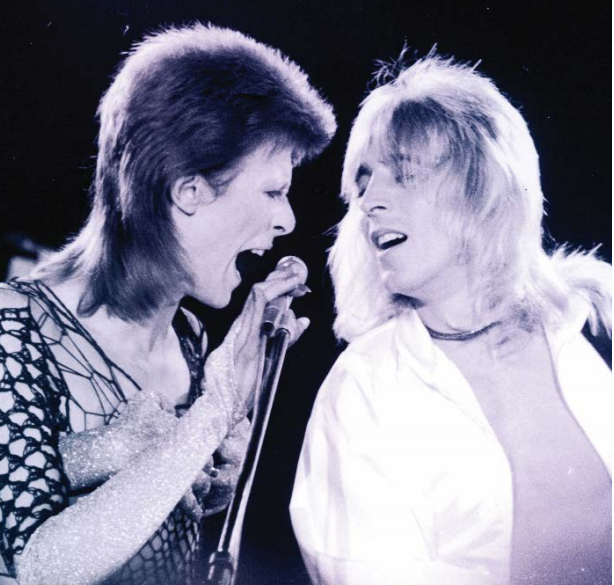
David Bowie and Mick Ronson, in a photo taken at a different performance.
Bowie and the Spiders – Mick Ronson, Trevor Bolder and Mick “Woody” Woodmansey – delivered an impressive show despite Bowie suffering from the flu. The set included such numbers from the Ziggy Stardust album as “Hang Onto Yourself,” “Lady Stardust,” “Moonage Daydream,” “Five Years,” “Starman” and “Suffragette City”” and Hunky Dory songs “Changes,” “Life on Mars?” “Queen Bitch” and “Andy Warhol.” Bowie also played an acoustic set midway through the concert.
But as longtime music journalist Lisa Robinson noted in her review, “the high points of the show were definitely the rock ‘n’ roll numbers… Wearing first the red, beige and blue print jumpsuit and then changing into a gold and black quilted number, David looked gorgeous. I really don’t think that there is anyone around who is quite so… extraordinary looking… the hair, the way he moves around the stage, and especially the way he’s got his music together – all of it just really works.”
She also singled out Ronson for praise. “He’s incredible. I can’t remember when so many people actually said that they enjoyed a guitarist so much… Mick’s solos… were brilliant… Plus – Mick is a great beauty and developing into quite a star on his own.”
Watch Bowie and his band perform “Starman” on Top of the Pops in July 1972
Related: Bowie in the ’70s: ‘I never felt like a rock star’
The evening was recorded for a planned live Ziggy Stardust album that never came to fruition. One track from the show, “My Death,” did see the light of day on 1995’s RarestOneBowie compilation.
Bowie ended the set with two numbers by the New York-based artist he and Ronson had just produced, Lou Reed – “Waiting for the Man” and “White Light/White Heat.” And then encored with “Round and Round.” The evening had its desired impact, and Bowie soon became an indelible presence on the American music scene.
On March 31, 2016, numerous recording artists performed at Carnegie Hall to pay tribute to Bowie, who had died that January.
Bowie’s extensive recorded legacy, including many deluxe editions, is available in the U.S. here, in Canada here and in the U.K. here.


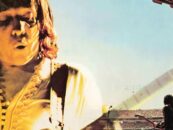
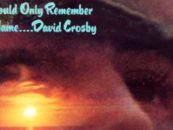
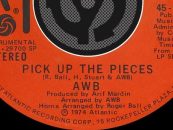
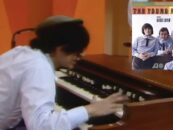

4 Comments so far
Jump into a conversationI was there. Got a ticket in the very last row.This began my 45 years of following Bowie. A few months later I saw him again at Radio City Music Hall. Mick Ronson was a big part of his sound. Long live Bowie!
Wow. Congratulations that had to be a show to remember. I was at the Radio City Music Hall show for Valentines Day. Will remember forever and have told people and friends over the years what a fantastic memorable experience it was
It should be mentioned, of course, that Bowie chose Cleveland to open his first-ever U.S. tour a few days earlier. . .something that rarely is noted. And believe me, that was quite a concert also.
you are quite right-i was there what a night-